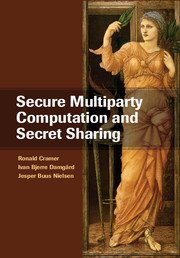Ronald Cramer (Centrum Wiskunde & Informatica), Ivan Damgard and Jesper Nielsen (Aarhus University) recently published the first book ever on information-theoretically secure multiparty computation (MPC) – a subfield of cryptography that describes security systems that cannot even be broken by quantum computers or unlimited computing power. The publication of the book on quantum-safe systems was celebrated in Aarhus, Denmark, on 16 October 2015. The new book, 'Secure Multiparty Computation and Secret Sharing', was published in July 2015 by Cambridge University Press. The text comprises fundamentals of cryptography that were partly invented by the authors, covering 30 years of research in the area, and they are cast in an entirely novel technical framework. It is interesting for mathematicians and computer scientists alike, and can be read by the range from master students to senior researchers for a complete, coherent vision of the field.
The MPC research involves shared computations on mutually secret data between parties who do not trust each other, while the privacy of one's own data in regard to the others’ is maintained. For this reason, the parties involved simulate the functionality of a trusted third party, without the need for a real one.
The fundamental research has interesting applications. Researcher Ronald Cramer, who, next to CWI, is also affiliated to the Mathematical Institute at Leiden University, says: "In Denmark an annual auction is being organized by a multinational to sell the production rights of sugar beets. The bidding strategies in this auction, which may reveal a lot of sensitive economic information about individual parties, are to be kept secret. Therefore, the auction mechanism runs on a secure MPC platform."
Ronald Cramer continues: "Another application is electronic voting. At the end of the 1990s CWI and IBM (USA) developed a new cryptographic system for electronic elections, which was recently brought to the market by a Belgium company. Since 2010 it has also been used for, amongst others, the Princeton undergraduate election, for ACM council elections and for the election of the board of IACR, the International Association for Cryptologic Research”.
The auction system uses the Cramer-Damgard-Ishai pseudorandom secret sharing technique from 2005 (CDI05) and the voting system uses the Cramer-Gennaro-Schoenmakers cryptographic voting technique from 1997 (CGS97).
More information

------------------------------------------------------
Secure Multiparty Computation and Secret Sharing
Ronald Cramer, Ivan Bjerre Damgård, Jesper Buus Nielsen
Cambridge University Press
ISBN: 9781107043053
http://www.cambridge.org/9781107043053
------------------------------------------------------
The research for this book was partly funded by the the Netherlands Organization for Scientific Research Vici Grant 2006 for Ronald Cramer.
Homepage of Ronald Cramer: http://homepages.cwi.nl/~cramer/
Homepage of Ivan Damgard: http://www.daimi.au.dk/~ivan/
Homepage of Jesper Nielsen: http://www.cs.au.dk/~jbn/
Cryptology group at CWI: http://www.cwi.nl/research-groups/Cryptology and https://projects.cwi.nl/crypto/index.php
The cover text of Cambridge University Press reads: “In a data-driven society, individuals and companies encounter numerous situations where private information is an important resource. How can parties handle confidential data if they do not trust everyone involved? This text is the first to present a comprehensive treatment of unconditionally secure techniques for multiparty computation (MPC) and secret sharing. In a secure MPC, each party possesses some private data, while secret sharing provides a way for one party to spread information on a secret such that all parties together hold full information, yet no single party has all the information. The authors present basic feasibility results from the last 30 years, generalizations to arbitrary access structures using linear secret sharing, some recent techniques for efficiency improvements, and a general treatment of the theory of secret sharing, focusing on asymptotic results with interesting applications related to MPC.” (Source: Cambridge University Press.)
Picture above: The three MPC book authors at the Computer Science department in Aarhus on 16 October 2015, from left to right: Jesper Nielsen (Aarhus University), Ivan Damgard (Aarhus University) and Ronald Cramer (CWI and Leiden University). Picture: Ms. Trine Ji Holmgaard Jensen.
